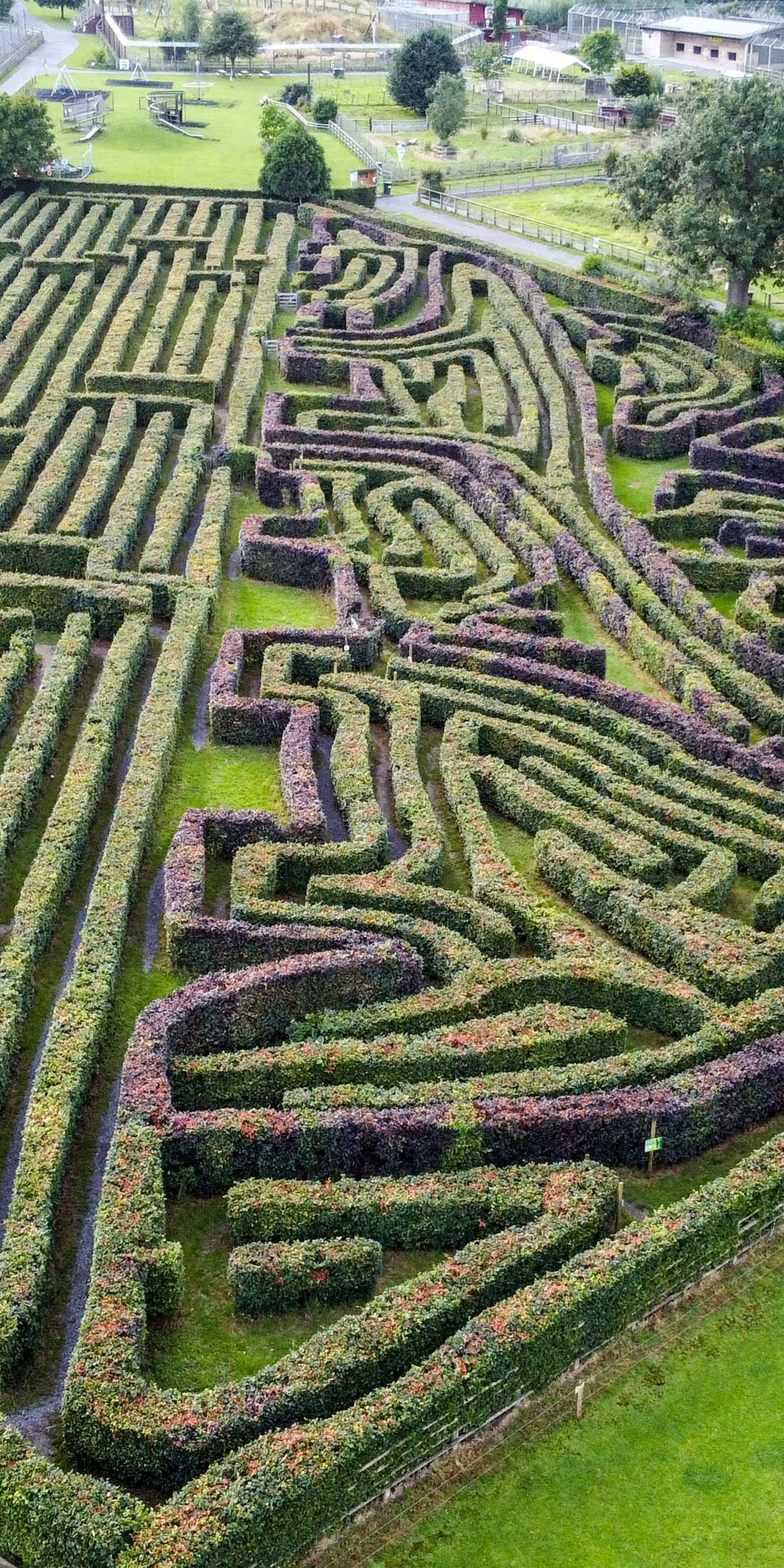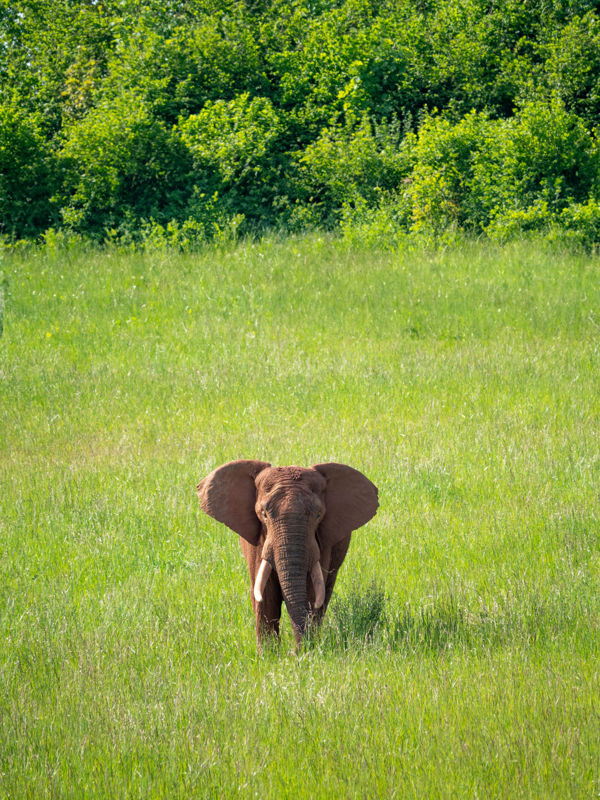Celebrating International Men’s Day: Tom Lindley, Head Elephant Keeper
18th Nov 2025
This year, International Men’s Day focuses on positive role models and the importance of men’s wellbeing. At Noah’s Ark Zoo Farm, we are incredibly lucky to have many caring, dedicated and passionate men across our team.
Among them is Tom Lindley, our Head Elephant Keeper. Tom leads the team caring for our bull group of African elephants: Shaka, Janu, Uli and Sutton.
Q: Have you always wanted to work with elephants? What sparked that interest, and how did your career begin?
I have always wanted to be a Zoo Keeper for as long as I can remember. When I was a child, I wanted to work with Great Apes. I always adored elephants, but hadn’t given much thought to working with them.
When I started my zookeeping career, I thought I wanted to work with Big Cats, and I was lucky enough to start out with them. But over a short period of time I realised it wasn’t for me! I was extremely lucky to get a Trainee Keeper position with elephants, and ever since my first day I have absolutely loved every minute of it. Over 12 years later, I have worked my way up to become the Head Elephant Keeper, and I now manage one of the very best elephant facilities and programmes in Europe.
Q: Working with elephants requires strength, but also patience and emotional awareness. What qualities have helped you the most?
Elephant keeping is a very physically demanding job, as you can imagine, but there is an awful lot of mental strength required too. Elephants are such intelligent, complex, sometimes complicated animals, so knowing your elephants and their individual personalities, quirks and needs is paramount.
As Elephant Manager, I must make calls on a daily, weekly or long-term basis that will affect the elephants’ welfare and relationships. The magnitude of this can be stressful, but a good sense of confidence and evidence of success helps massively. I am also very lucky to have a really solid team under me who I can lean on for opinions and to bounce ideas off.
Patience with elephants is huge. A lot of people expect too much of their elephants and become frustrated quickly, which will affect your working relationship with the animal. Keeping a cool, level head around them at all times is so important to the relationships you build with them.
Q: Did you ever feel pressure to fit into a stereotype of what a man “should” be - whether in the zoo industry or outside of work?
Despite the fact that it is very common for men, especially young men, to feel like they need to fit a certain character to be deemed a man, I have been really lucky to work with very accepting, caring team members since my career began. Even as a much younger keeper, my seniors always wanted the best for everyone, and I’ve never been made to feel that I had to act a certain way to be a “real man.”
Historically, elephant keeping has been a very masculine-led and almost macho environment. These days it is much more equally split and a more relaxed environment to work in. I’ve had the pleasure of working with a pretty much even split of genders within my Elephant Team over the last decade or so. As a manager over the last five years, I have worked predominantly with men - until very recently. Moving into a managerial role with younger men on the team gave me the opportunity to take a step back and reassess how I needed to adapt my approach and management skills to act as a good role model and leader. Making sure my whole team know they can come to me whenever they need to, whether in the zoo or outside of it, is really important to me. I want to continue being a good leader and role model to my excellent Elephant Team.
Q: What does a typical day as Head Elephant Keeper look like?
A normal day for me looks like this: getting to the zoo around 7:30am, coming down to the elephant barn and making sure the elephants are all up, awake and okay. I relay the plan for the day to my team, delegate daily tasks and check in with everyone.
We then clean the elephants’ mess from overnight in the outside area while they stay inside together eating fresh food. After that, I lead training sessions with the elephants, usually with two or three of us carrying out daily husbandry care on each elephant. We also have to clean the inside area while refreshing enrichment, hay nets and browse bunches (tree branches for feeding). I make sure deadlines are met for public engagement, such as visitor talks. Otherwise, I get stuck into the daily tasks with the rest of the team, all while keeping an eye on everybody to make sure they know what they’re doing and that everyone is okay.
Q: How do you look after your mental wellbeing with such a demanding role?
As demanding and consuming as being a Head Elephant Keeper can be, I try my very best to leave any work stress at work. When I go home, I don’t worry about things that happened today or may happen tomorrow. I trust my team and my own judgement enough to go home knowing that the elephants are taken care of and nothing is going to go awry.
Spending time with friends and family outside of work is very important to me, as well as spending time in nature - walking, hiking, exploring new places. I also regularly spend time with a large group of friends supporting our local football club, as stressful as this can sometimes be! These are all things I consider good for my mental health.
Q: Has caring for elephants taught you anything about yourself?
I think as I’ve gotten older and become more cemented in my role as Head Elephant Keeper, I’ve realised I am a lot more capable than I have given myself credit for in the past. The job I do here is no easy feat, and it can be easy to feel swamped and under a lot of pressure or stress. But believing in myself and my team really helps to keep me level, and the evidence in the quality of life we provide for our elephants continues to motivate me to be the very best.
As I’ve said, elephants are incredibly intelligent and complex creatures. They have deep emotional sides that most people don’t get to see. Once you get to know them, there is a lot of human likeness in an elephant.
Q: What does International Men’s Day mean to you?
International Men’s Day is something that should be celebrated. To me, it is an opportunity to promote the good work, care and leadership that men in certain roles provide - whether that be to the general public or within a small team like mine. It is very important.
Raising awareness for men’s mental health is also really important. Unfortunately, historically, it hasn’t been spoken about very much, and this has resulted in a lot of men struggling to manage their own mental wellbeing. Thankfully, I feel like the tides are beginning to turn and people are becoming much more aware and open to talking about men’s mental health.

Sign Up to the newsletter
Would you like to receive marketing emails from us? Please tick the box if you would like to receive information about future events, ways you can support our charity, offers and discounts.





